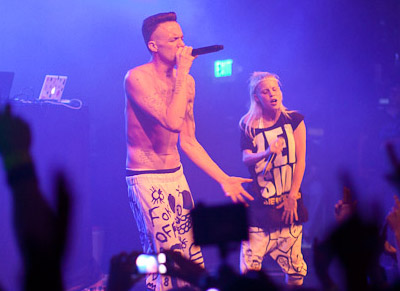Using a word like ‘faggot’ normalises hate. It’s not okay
 Not only are Die Antwoord famously attention seeking, but their personas – on stage and online – are just that, caricatures of the real people standing behind them and not meriting a response.
Not only are Die Antwoord famously attention seeking, but their personas – on stage and online – are just that, caricatures of the real people standing behind them and not meriting a response.
These characters seem to make others hesitant to criticise but it was exactly this hesitance that was drawn on by Triangle Project to respond.
In this case, it was the homophobic slur used by Die Antwoord’s Yo-Landi Visser on Instagram where she called Drake “a massive faggot”. This hesitance and the ridiculous personas adopted by both members of the group have served to insulate them from some of the harsh criticism that others in the public eye would have to endure for a similar action.
Die Antwoord has previously been reprimanded for using a homophobic slur and argued that “faggot” is “not offensive in South Africa”, because our society is embracing of colour, religion and different “sexual styles”.
This is, of course, nonsense.
First, because “faggot” is an offensive term in South Africa, even if it is not the most common homophobic slur in use – ask anyone who has had it screamed at them in the street at 2am and see if they felt threatened or offended.
Second, the reference to South Africa’s liberal constitutional guarantees is not only ironic – the same bill of rights prohibits discrimination on the grounds of sexual orientation and hate speech – but is blithely ignorant of the lived realities of lesbian, gay, bisexual, transgender and intersex individuals in South Africa who face frequent and deadly violence.
It is also telling that Visser’s Instagram account no longer has the image in question, which says a lot about whether it can be viewed as offensive.
Beginning this week, a court in Ceres will hear testimony of the brutal torture and murder of David Olyne, a 22-year-old gay man from Ceres that no doubt had had the word “faggot” thrown at him during his tragically short life.
David was tortured while his wrists and ankles were bound with wire, he died after a rock smashed his head, thrown by a man who had invited local children to “come watch him kill a moffie”.
Words are not abstract, they do not exist in a vacuum outside of the context of a country racked by gender-based violence, racism, poverty, and homophobia and they have the power to kill.
Homophobic slurs are hurtful in and of themselves; they devalue individuals and make it difficult to live out their own lives. What is more concerning is not the effects of the word on the individual, but on the wider society. Here, their use normalises intolerance and hate.
David’s murderer wasn’t killing another person, he was killing a “moffie” a “faggot”, a lesser-human who didn’t deserve to live.
Words like “faggot” and “moffie” are powerful and dangerous because they allow people to not see each other as the individuals they are, but as gross caricatures, it allows people to see through humanity and empathy and literally stone an innocent 22-year-old man to death.
Die Antwoord cannot remove words like “faggot” out of the real world, where lesbian, gay, bisexual, transgender and intersex people face physical and sexual violence on a daily basis because of their sexual orientation.
We must take a stand against language that imagines people as “less than” and that makes them vulnerable and ultimately expendable.
These crimes do not begin from nowhere; much like racist and xenophobic attacks they travel down a road that has been paved by the dehumanisation and humiliation of slurs and hurtful words.
As a member of the Hate Crimes Working Group, Triangle Project takes a firm stance against hate speech because of the hurt it causes and because of the atmosphere it creates.
We must always see the links between the violence of words and the violence of acts.
Matthew Clayton is research, advocacy and policy coordinator for the Triangle Project.
This article was first published by City Press.
well, like i said. if they used the k-word they would have gotten stoned by their fans. but the word faggot is ok because gays, in the eyes of the world anyway, are sub-human. so glad i have never purchased any of their music even though i used to enjoy it. their videos are so good and i do like their image. but wrong is wrong.
Die Antwoord – should come to places like Bonteheuwel, Heideveld, Netreg, Nyanga, Bridgetown, Kewtown – and see where their phrase “faggot” get’s them… They should stop living in a bubble… I’ve only heard of them – never listened to their music or seen their videos – and I’m so much better off!